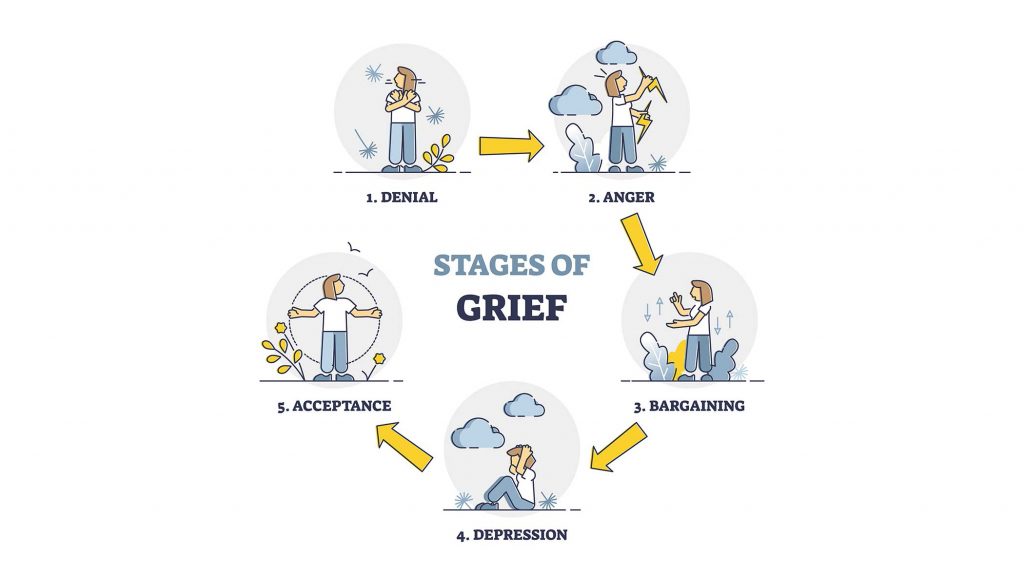According to the Centers for Disease Control and Prevention (CDC), over 70,000 lives were lost to drug overdoses in 2019. Each one of those people was a loved one: someone’s son, daughter, sister, or brother.
Losing a loved one to addiction can be unexpected and will likely lead to feelings of confusion, uncertainty, anger, and sadness. Although there is no right or wrong way to grieve, a qualified professional can help you learn healthy coping strategies.
Emotions Associated With Grief & Loss
Grief is a natural reaction to loss. The death of a friend or family member can cause overwhelming pain, shock, and devastation. Losing a loved one to alcohol addiction or drug addiction can pose more challenges during grief recovery.
Although addiction is a disease, it can be difficult for society and loved ones to understand. The threat of overdose death is often not enough to stop someone from compulsive drug use. Losing someone to substance use disorder can lead to feelings of guilt, shame, anger, and confusion.
Other common emotions and behaviors associated with grief may include:
- depression
- social withdrawal
- outbursts
- loneliness
- anxiety
- vivid dreams/nightmares
- fear of judgment regarding addiction
- lack of closure
Everyone Grieves Differently
While tears are a common reaction, they are not a requirement in the healing process. It is important to remember that loss affects everyone differently.
Your emotions are valid and a normal reaction to a traumatic experience. Although grief may feel overpowering, intense emotions should lessen over time.
Grieving is a difficult time and feelings associated with loss can interfere with daily life and affect physical and mental health. With grief, you may experience changes in appetite and sleep patterns, including dreams related to your loved one.
The Five Stages Of Grief
You may have heard of the usual stages of grief, including denial, anger, bargaining, depression, and acceptance. Although these stages are considered a common progression of grief, individual experiences may vary and loss from a drug-related death can complicate this process.
You do not have to experience any or all of these stages to heal. You may experience them out of order or not at all.

Denial
At first, you may not want to acknowledge the loss of your loved one. Recognizing the loss may cause uncomfortable feelings to surface that you may not feel ready to experience.
Anger
You may feel angry that your loved one struggled with alcohol or drug abuse, even if you understand it is a disease. You may look for someone to blame, including people that were involved in your loved one’s life.
Bargaining
You may feel powerless and attempt spoken or unspoken bargains as a way of gaining control over your loss. You may create negotiations or promises in hopes of bringing back a loved one.
Depression
After the loss of a loved one, you may feel helpless, hopeless, or lonely. You may feel an emptiness and yearn for your loved one. If feelings of depression lead to suicidal thoughts or behaviors, hospitalization or professional help is crucial.
Acceptance
This stage is about learning to accept the loss and the ways it impacts your life. Accepting the loss doesn’t mean you are okay with it or erasing them from existence. It means you are in the process of learning to live in a new reality.
There is no specific timeline for grieving a loved one. Everyone will heal at a different pace and it’s important to be gentle with yourself and to not compare yourself to others’ experiences.
Who Can Help?
If feelings associated with grief interfere with life, you may need help from professionals or peers who have had similar experiences. It is important to talk about your loss with others, which can help you recognize the loss and understand how it affects you.
Grief Support Groups
With the help of a trained professional, support groups can help you share difficult feelings in a safe and supportive setting. Support groups can reduce feelings of loneliness and help you connect with others.
They may be virtual or in-person and can introduce you to others who are going through similar experiences. In fact, there are an endless variety of support groups, including ones specifically for those who lost someone to substance use.
Grief Counseling
Although there is no right or wrong way to grieve, a professional may be beneficial if grief is interfering with daily life. Grief counseling, which may be done in an individual or group setting, can help you learn healthy ways of coping.
Depending on your treatment plan, therapy goals may include:
- identifying how the loss impacts your life
- understanding uncomfortable feelings, like anger or guilt
- discussing your relationship with your loved one
- learning how to adjust to a new reality
- working through fears regarding addiction, stigma, and death
Emotional support can help you regain a sense of stability and learn to function through the difficult grieving process.
If a loved one is struggling with substance abuse, we can offer help and support. Please contact our helpline today to learn about how our addiction treatment programs work.
Sources:
Centers For Disease Control And Prevention (CDC) — Drug Overdose Deaths
Frontiers in Psychology — Coping Strategies and Complicated Grief in a Substance Use Disorder Sample
MMC: Psychiatry — The Many Victims of Substance Abuse


